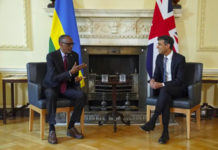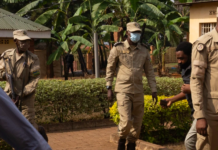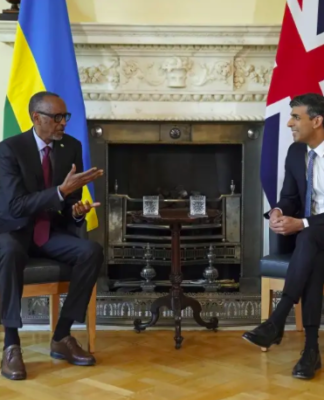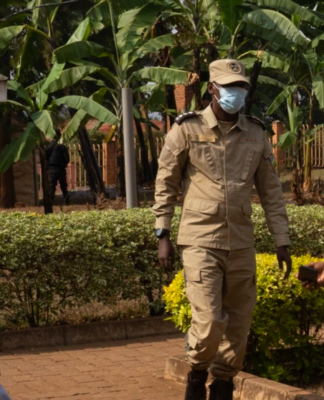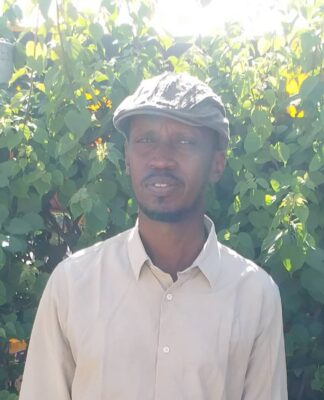By The Rwandan Lawyer
Shyaka Gilbert owner of the youtube channel “ijwi ry’imfubyi” which is critical vis-à-vis the Kigali regime as it denounces the crimes of murders committed by the soldiers of RPF since 1990 otherwise implying a sort of genocide against Hutu, disappeared and his wife Dushimirimana Antoinette was arrested in a sort of blackmail to probably push the former to appear. The present article analyses the misadventure suffered by this young 27-year-old woman for a week in the hands of the police.
Who is Shyaka Gilbert?
Shyaka Gilbert native from ex-Giti commune renowned for a sole area where there was not genocide committed against Tutsi there but on the contrary where RPA soldiers massacred civil Hutu population, the outstanding being the priests who were residing at Rwesero Minor Seminary. As he unclosed that his late father was assassinated in 1994 by APR; founded a YouTube blog called «ijwi ry’imfubyi» where he granted interviews to victims of RPF since 1990 when this organization invaded Rwanda. Worse, he dared writing to the president of the republic requesting for a transparent investigation on people who disappeared or were killed by the RPA.
All occurred when Shyaka Gilbert and his wife Dushimirimana Antoinette travelled from Kigali to be part of a burial in Mukono sector and were intercepted by police officers who were dressing as civilians. They started bullying them and he succeeded to escape from them. They seized her wife Antoinette and slapped her seriously that her ears were damaged. Then they went at Katuna border to check whether the wanted individual had passed the frontier but officers working there did not perceive him in the area but some of them stated having seen him driving a bicycle. Meantime, under torture and intimidation, the wife Antoinette succeeded to talk with him by phone which assured those policemen that he was still inside the country. Regardless of this assurance, they decided to detain for 5 days without any warrant this mother of 2 children at the police station of Remera where she was subjugated to interrogations about her background, information about her husband; why her husband criticized the regime of Rwanda.
Analysis
Torture and blackmail
torture” means any act by which severe pain or suffering, whether physical or mental, is intentionally inflicted on a person for such purposes as obtaining from him or a third person information or a confession, punishing him for an act he or a third person has committed or is suspected of having committed, or intimidating or coercing him or a third person, or for any reason based on discrimination of any kind, when such pain or suffering is inflicted by or at the instigation of or with the consent or acquiescence of a public official or other person acting in an official capacity. It does not include pain or suffering arising only from, inherent in or incidental to lawful sanction. Even if Rwanda is part of the convention against torture and other cruel and inhumane treatments, police and intelligence officers continue to exercise this practice beating people and imposing excruciating pain on them to obtain from them confessions or needed information they are supposed to detain. Antoinette was victim of torture whereby she was slapped and whipped by an electric cable and she was compelled to invent that he husband was fleeing to Uganda.
Besides, Blackmail is an act of coercion using the threat of revealing or publicizing either substantially true or false information about a person or people unless certain demands are met. It is often damaging information, and may be revealed to family members or associates rather than to the general public. It may involve using threats of physical, mental or emotional harm, or of criminal prosecution, against the victim or someone close to the victim.[1][2] It is normally carried out for personal gain, most commonly of position, money, or property.[1][3][4][5] It is also used, sometimes by state agencies, to exert influence; this was a common Soviet practice, so much so that the term “kompromat“, transliterated from Russian, is often used for compromising material used to exert control.Blackmail may also be considered a form of extortion. Although the two are generally synonymous, extortion is the taking of personal property by threat of future harm. Blackmail is the use of threat to prevent another from engaging in a lawful occupation and writing libelous letters or letters that provoke a breach of the peace, as well as use of intimidation for purposes of collecting an unpaid debt.
In many jurisdictions, blackmail is a statutory offense, often criminal, carrying punitive sanctions for convicted perpetrators. Blackmail is the name of a statutory offense in the United States, England and Wales, and Australia, and has been used as a convenient way of referring to certain other offenses, but was not a term used in English law until 1968.
Blackmail was originally a term from the Scottish Borders meaning payments rendered in exchange for protection from thieves and marauders. The “mail” part of blackmail derives from Middle English male meaning “rent or tribute” This tribute (male or reditus) was paid in goods or labour (“nigri”); hence reditus nigri, or “blackmail”. Alternatively, it may be derived from two Scottish Gaelic words blathaich – to protect; and mal – tribute or payment.
In the specific case of Antoinette Dushimirimana, the police decided to keep her in custody to push her husband to appear and till now she suppose that he was captured by the police given that they released her.
Illegality
Enforcers of law are daily infringing laws. This lady was tortured and arrested in the place of the suspect who is her husband and these acts carried out by the police officers against Dushimirimana Antoinette are overtly illegal. Indeed, the constitution of Rwanda in its article 15 states that Every person has the right to physical and mental integrity. No person shall be subjected to torture, physical abuse or cruel, inhuman or degrading treatment. According to article 17 of the same text, Criminal liability is personal. Civil liability is determined by law. No one shall be punished for crime he didn’t commit. All the same, punishments are applicable to the offender and not to his family or heirs.
Conclusion
Gilbert Shyaka wrote to the Head of State about violations of fundamental rights committed by his RPA soldiers. Will he get the response? Undoubtedly, the arrest and prosecution constitute the indirect feedback of his queries. The Rwandan regime has seemingly launched a hunt for the least opponents and this initiative pushes the police to execute it violently attacking anyone to whom the rumors orient them without a spirit of discernment. With time, Rwandan citizens fed up by these violations of their fundamental rights dare to request for justice and create blogs which awaken the public and the state is angered and worried about its effects. This is the price of freedom of press and the right of expression.

